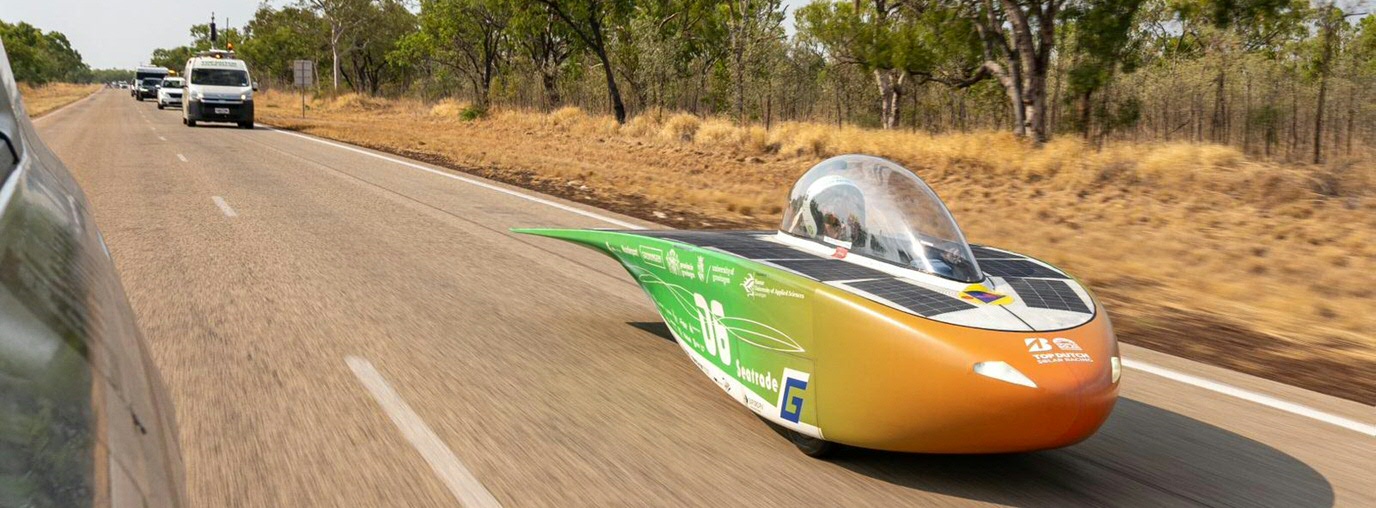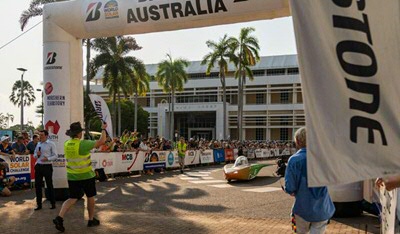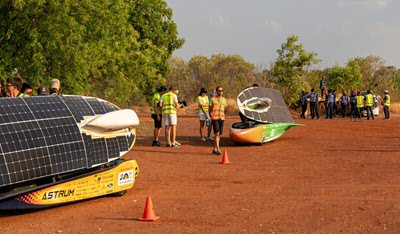Top Dutch Solar Racing: 'The racing is fun, but it's ultimately about innovation'
Top Dutch Solar Racing is competing this week in the World Solar Challenge, the world championship for solar powered cars in Australia. Despite a setback in preparation, the team is well on course with a seventh place. Team members Jochem Hulsebos and Loeka Demkes talk about their experiences in the Australian outback.

The Bridgestone World Solar Challenge is a race specifically for solar-powered cars and crosses Australia over a distance of more than 3,000 kilometres. It starts in Darwin and goes through Alice Springs to Adelaide. Groningen-based Top Dutch Solar Racing (TDSR) kicked off the Challenge successfully. During qualification last Saturday, the team secured a fourth starting position with their solar car, Green Thunder. After three days of racing in the Australian outback, the team is seventh in the overall standings.

Wallabies and road trains
'We are obviously going for the best result,' says team member Loeka Demkes (communications and marketing). 'I would like to say we are going for the title, but there are a lot of good teams out there. Besides, there are always things happening that we cannot control.' For instance, the team has to deal with crossing wallabies, bushfires and road trains: freight trucks with as many as nine trailers. 'And then fatigue also plays a role. We have to stay sharp for a week.'
Staying focused is definitely the motto for team member and driver Jochem Hulsebos. 'It's a very strange feeling driving through the outback,' he says. 'Sometimes the scenery is the same for hours. Moreover, while driving, it can get very hot in the car. The key is to deal with that in a good way. Fortunately, we were able to train on the Groningen campus is a HEAT-house, where we could simulate conditions up to 55 degrees, so we learned how to deal with the heat better.'

Setbacks and innovation
Even before the race officially started, TDSR faced a major setback, Demkes says. 'During a test run, the solar deck with our solar panels flew off. This damaged the deck. It happened at a point where teams had previously also run into trouble due to strong gusts of wind. Fortunately, no one was injured and the damage was limited. Despite the damage to the solar deck, our car still has enough energy income to race.'
The solar deck in particular is a major weapon of TDSR. Most other teams use solar panels made of silicon. 'We too use these silicon cells,' Demkes explains. 'But we also use perovskite solar cells on our car. These cells are a lot more efficient. The company that developed this technology chose our team to test the solar panels during the race. This fits exactly with the purpose of the World Solar Challenge, which is ultimately about developing new things. Racing is fun, but innovation is even more important.'
At TDSR, this innovation happens with students from the University of Groningen, Hanzehogeschool, NHL Stenden, Alfa-college and Noorderpoort, Demkes emphasises. 'In our team, students from mbo (secondary vocational education, ed.), hbo (university of applied science, ed.) and university work together. That makes it unique. The race team is a platform where students can develop outside their classrooms. The ultimate goal is to promote green mobility and sustainable energy technologies. The innovations that are tested in this race and prove successful will later return to the consumer market.'
Update (26/10): Belgium's Innoptus Solar Team from Leuven won the World Solar Challenge on Thursday. The solar car from Twente finished second just 20 minutes later, followed by Delft. Top Dutch Solar Racing expects to complete the final 30 kilometres on Friday, finishing in sixth place.
More news
-
15 September 2025
Successful visit to the UG by Rector of Institut Teknologi Bandung

